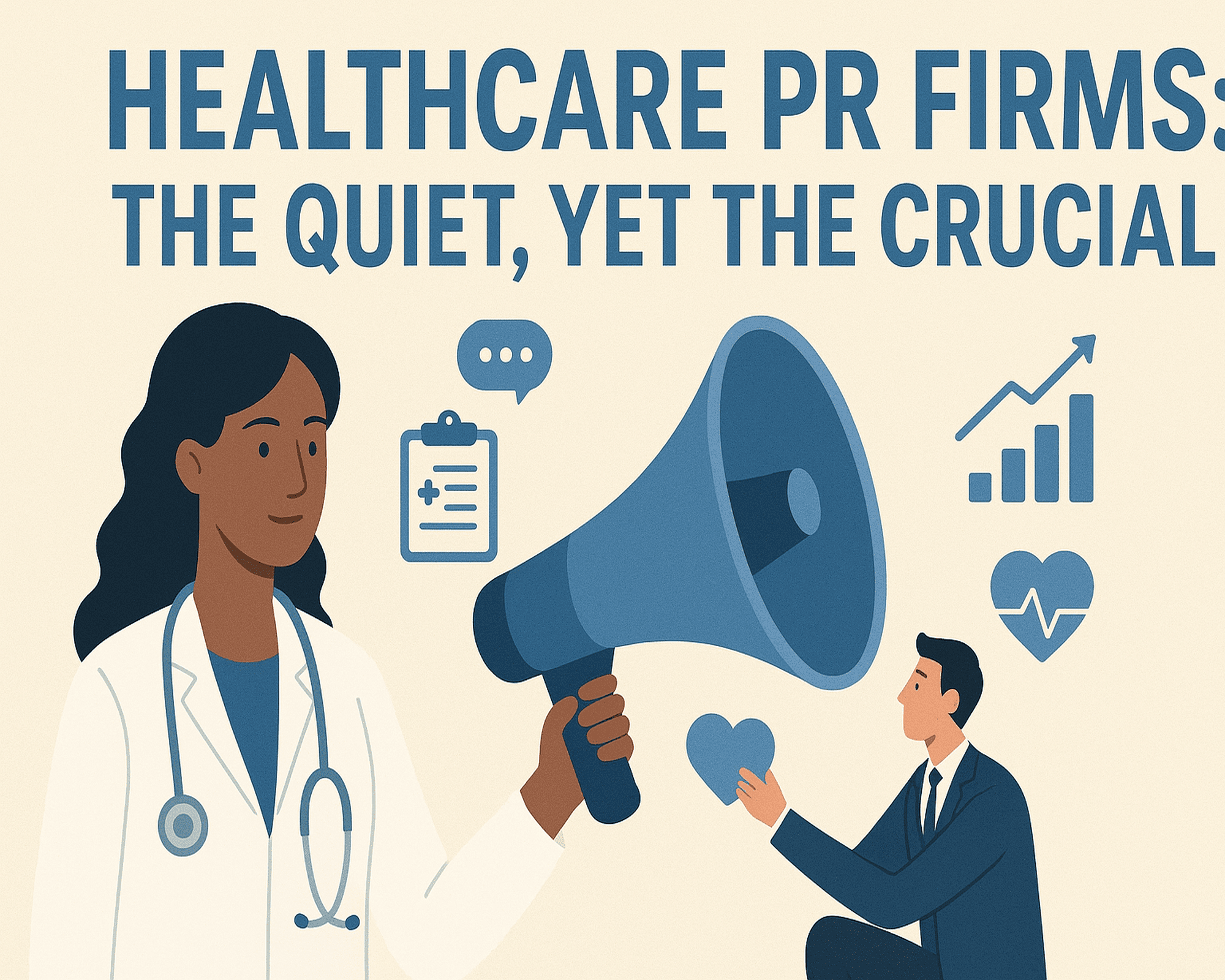Explore the role of healthcare PR firms in building trust, managing reputation, and shaping the future of medical communication.
In healthcare, trust means everything. One headline can calm people, another can cause doubt. That’s why communication here isn’t about loud ads or endless noise. It’s about real conversations that matter. From a small clinic to a growing biotech, the way they speak to the public can shape reputation, and sometimes even patient choices.
That’s where healthcare PR firms come in. They act like connectors, helping doctors, patients, and communities understand each other. Their pr specialists take tough medical terms and put them into plain words, and share stories that show the human side of medicine.
Moreover, as healthcare keeps changing and digital platforms take over, PR becomes more important than ever. So, let’s see how healthcare PR firms handle all this.
What Are Healthcare PR Firms?
Photo by camilo jimenez on Unsplash
Say “public relations” and most people picture flashing cameras, a staged press event, or a glossy magazine spread. Healthcare PR is nothing like that. PR gurus at Impact Authority say that it works in a world where trust, care, and accuracy aren’t optional—they’re everything.
More Than Just Public Relations
Most PR firms handle clothing lines, gadgets, or the latest app launch. Healthcare PR firms do a very different job. Their clients are hospitals, pharma companies, device makers, and wellness brands. And they are often explaining complex issues with ease and care.
Instead of slogans or quick campaigns, these firms create messages that teach patients, guide doctors, and protect reputations. You see, talking about a new drug isn’t like advertising sneakers. If you get the words wrong, people could panic, or worse, lose trust.
Why They Stand Apart
What makes healthcare PR different? Sensitivity. These firms step into conversations about mental health, safety, and life-saving treatments. Every word matters. They need to keep the public informed, but without creating fear.
There’s also the rulebook. In healthcare, nothing goes out without checks and approvals. Every press release, every campaign, must follow strict laws on privacy and safety. Even the simplest announcement can go through layers of review before it sees the light of day.
Bridging the Gap Between Science and People
One of the biggest challenges is language. Medical terms often sound like another language to patients. Healthcare PR experts translate that jargon into simple, human stories.
Take a new hospital wing, for example. Instead of just announcing its opening, they’ll share a patient’s journey, highlight the doctors, and explain the breakthrough in everyday words. Facts turn into stories that people can actually connect with.
A Foundation of Trust
At the center of it all is trust. Patients want reassurance. Doctors want respect for their work. Hospitals want their reputation protected. A good healthcare PR firm brings all of that together.
They don’t just tell stories. They guard credibility in one of the most delicate industries there is. Their role is to make sure every message feels honest, clear, and above all—human.
Why Healthcare Needs Specialized PR
Image by Barkha Mishra from Pixabay
Public relations doesn’t follow a single recipe. What grabs attention for a fashion brand or tech company doesn’t always land in healthcare. Here, the subject is people’s lives, not just shiny products, and that shifts the entire playbook. That’s why medical public relations agencies bring more—knowledge, empathy, and a way of speaking that feels real and builds trust.
The Human Weight
Healthcare is deeply personal. A headline about a new treatment, a hospital mistake, or even a vaccination drive can stir feelings—fear, hope, relief. Generic PR doesn’t cut it. Every sentence needs care. Healthcare communication companies know facts aren’t enough; tone matters. The right message can calm, while the wrong one sparks fear.
Trust at the Core
Trust drives healthcare. Patients hand doctors their lives. Communities lean on hospitals in crises. People expect drug companies to act responsibly. A single careless statement can break that trust. That’s why healthcare PR firms center everything on credibility. They help protect reputations and restore them when shaken.
Crisis Never Sleeps
In healthcare, crises arrive without warning—an outbreak, a recall, a lawsuit. Silence is risky, but speaking too fast can make things worse. Skilled PR teams know how to react quickly, shape the story, and share accurate updates that cool tension instead of fanning flames.
The Rules Game
Then there’s regulation. From HIPAA in the U.S. to global data laws, every line of communication must follow strict codes. One wrong phrase can mean legal trouble. Healthcare PR experts know these boundaries and still craft messages that inform and engage.
Clarity Over Jargon
The science itself is another hurdle. Research papers, trial data, and medical terms confuse most people. Patients want straight talk, not jargon. So, healthcare communication companies turn complex details into simple, relatable stories. That clarity doesn’t just inform—it gives people confidence to make better choices.
Beyond Promotion
In the end, healthcare PR goes far beyond simply promoting services or products. It’s about fostering meaningful conversations that safeguard reputations, build strong relationships, and, at times, even protect lives. This is why it matters—because it transforms complex, sensitive issues into messages that feel clear, human, and trustworthy. When combined with the power of digital PR services, these efforts become even more impactful, ensuring that vital messages reach the right audience with credibility and precision.
Key Services Offered by Healthcare PR Firms
AI Generated Image
These are the main services offered by healthcare PR firms to help doctors, clinics, hospitals, and healthcare companies deliver the right message, the right way, to the audience.
Media Relations and Press Coverage
Healthcare news doesn’t sit still. A new treatment. A hospital opening. A biotech breakthrough. All of it can make headlines but only if the story is shared well. PR firms know how to pitch it, who to talk to, and how to get coverage in the right places. That visibility builds credibility and puts medical voices where people are already paying attention.
Crisis Communication and Reputation Repair
Crises move fast. A data leak. A faulty product. A malpractice claim. Any one of these can shake public confidence overnight. PR firms step in to steady the ship. They prepare clear, quick responses, keeping facts straight while protecting reputations. The goal is simply to control the story before it controls you.
Branding and Positioning
A hospital isn’t just a building. A clinic isn’t just a service. They’re brands. PR teams help shape how those brands sound and feel. They highlight wins, share success stories, and position leaders as experts. The result? A reputation people can trust and patients who stay loyal.
Digital PR and Social Media
Health talk happens online now. Patients share stories on Facebook. Doctors post on LinkedIn. People search for advice on Instagram or X. That makes digital PR important. So, healthcare communication companies create strategies to manage that chatter. From campaigns to reputation checks, they make sure an organization shows up strong and stays positive across platforms.
Content and Thought Leadership
Words matter. PR pros craft blogs, press releases, patient stories, even articles with doctors’ names on them. It’s not just about its credibility. Good writing helps an organization stand out as a trusted voice in healthcare.
Patient Education and Outreach
Healthcare is about more than fixing problems. It’s about prevention too. PR firms design campaigns that spread awareness vaccinations, wellness tips, health drives. These efforts build trust, help communities, and create stronger bonds between providers and patients.
Role of Healthcare Communications Companies
AI Generated Image
Most people think of communication as ads, press releases, or some neat slogan. In healthcare, it’s different. Words carry weight. A single phrase can calm a worried family or make a patient second-guess their treatment. That’s why communications firms do more than push news—they shape conversations that actually matter.
Plans That Don’t Sit on Shelves
Hospitals and clinics face challenges every day. One week it’s a new service to explain. Another week, it’s breaking tough news. Random updates don’t work. So, firms map out strategies that connect the dots. The aim? Make sure each message, no matter how small, ties back to the bigger story of the organization.
Keeping the Inside Running Smooth
It’s not just the public who needs clear words. Doctors, nurses, and even reception staff rely on updates too. Miss a step here, and chaos follows. That’s where communication teams step in—building simple systems like bulletins or quick training notes. Nothing fancy, just tools that keep people on the same page when time is tight.
Talking to Patients Like People
No one wants medical jargon when they’re already stressed. Patients want plain answers, maybe even a reassuring line that sounds human. Communications experts help providers create reminders, guides, and quick how-tos that feel approachable. It’s not marketing—it’s building trust one message at a time.
Battling Online Noise
Rumors spread like wildfire. A half-true claim about a drug or hospital can go viral overnight. If no one steps in, fear takes over. Firms track these moments, step in early, and drop facts that cut through the noise. Fast, clear, and calm. That’s how you fight misinformation.
Consistency Is Quiet Power
Mixed messages are deadly for trust. Imagine seeing one tone in a hospital ad, then a totally different style online—it just feels off. Communication teams make sure the voice stays steady everywhere. Patients notice that, even if they don’t say it. Consistency feels safe. And in healthcare, safe is everything.
Hospital Marketing and PR Services
Image by Gerd Altmann from Pixabay
Hospitals don’t just treat illnesses—they shape the lives of entire neighborhoods. But in today’s crowded healthcare world, skillful doctors and modern facilities aren’t enough. To be noticed, hospitals need clear communication and smart outreach. That’s where hospital marketing and PR step in. Often, they work together with healthcare PR agencies to build trust and visibility.
PR vs. Marketing: Understanding the Difference
It’s easy to mix them up. PR is about reputation—what people think and feel when they hear a hospital’s name. Marketing is more direct. It promotes a service, like a maternity ward or a new heart clinic. The magic happens when the two combine. PR lays the foundation of trust, while marketing brings in growth.
Building Trust Within Communities
A hospital isn’t just walls and machines. For many, it’s a lifeline. PR helps hospitals show they care—through free health camps, blood drives, or wellness talks. These efforts do more than polish an image. They build real bonds. And that loyalty can last far longer than a single visit.
Campaigns That Educate and Inspire
Marketing isn’t only about filling waiting rooms. It’s also about education. Campaigns may focus on vaccines, preventive checks, or new treatments. A good one encourages healthier choices and sparks confidence in the hospital. In some cases, it even saves lives.
Integrating Digital Strategy
Billboards once ruled hospital marketing. Not anymore. Patients now search, scroll, and click. Hospitals use SEO, social media, and online reviews to meet them there. This shift lets hospitals answer questions instantly and build trust in real time.
Case Studies in Action
Picture this: a hospital runs a campaign for its cancer center. The PR team shares survivor stories with the press. Marketing promotes events and targeted ads online. Together, they don’t just market a service—they share hope, which often matters more.
A Holistic Approach
At its core, hospital marketing and PR are about connection, not just publicity. One shapes reputation. The other highlights services. When combined, they help hospitals stay seen, trusted, and remembered in the community.
Benefits of Hiring a Medical PR Agency
AI Generated Image
Healthcare is tricky, and so is talking about it. A clinic or hospital may have skilled doctors, modern machines, and real care for patients. But if no one hears that story, it gets lost. That’s where medical PR agencies step in.
With strategy, empathy, and a clear voice, they help healthcare providers stand out in a crowded field.
Building Authority and Trust
Trust shapes every decision in healthcare. People go where they feel safe. A medical PR agency builds that trust by sharing real stories of successful treatments, patient journeys, and medical milestones. They also put doctors in the spotlight as experts. Bit by bit, this grows credibility and gives a clinic or hospital an edge over others.
Enhancing Brand Visibility
Great services don’t matter if no one knows about them. PR agencies make sure healthcare brands don’t stay hidden. They secure press coverage, shape online presence, and design campaigns that stick in people’s minds. It’s not just about being seen it’s about being remembered.
Navigating Rules with Care
Healthcare comes with strict rules. Privacy laws and ad regulations leave little room for mistakes. PR agencies know this world well. They tell strong stories while keeping within legal and ethical limits. This way, providers can share their work without fear of crossing lines.
Crisis Planning and Response
Problems in healthcare can appear fast. A drug recall, a malpractice claim, or an outbreak can harm reputation overnight. Medical PR agencies prepare for these moments. They write crisis plans, guide staff, and manage responses so patients feel informed and reassured instead of worried.
Stronger Patient Connections
PR isn’t only about new patients. It’s also about caring for current ones. Agencies build outreach programs, awareness drives, and education campaigns. These efforts create lasting bonds that keep patients engaged and loyal to their providers.
Growth That Lasts
The impact of PR doesn’t stop at quick wins. With steady branding, smart communication, and trusted media ties, agencies build a strong base for the future. Clinics and hospitals that invest in PR often find stability and growth even when times are uncertain.
How to Choose the Right Healthcare PR Firm
Image by Mohamed Hassan from Pixabay
Not every PR agency fits the healthcare world. The stakes here are higher, and mistakes carry real weight. Choosing a partner isn’t about who can spin a flashy headline, it’s about who understands the sensitive, complex, and deeply human side of medicine. So, how do you spot the right one? Let’s break it down.
Look for Industry Experience
Healthcare is not fashion. It’s not tech. And it’s definitely not lifestyle branding. Patients, doctors, and regulators expect a very different tone. The same principle applies when choosing Education PR services—schools, universities, and institutions also require a specialized voice that understands compliance, credibility, and trust. That’s why you want a PR team that has worked with hospitals, pharma brands, clinics, or educational organizations before. They already know the rules and won’t spend months catching up.
Test Their Crisis Skills
Here’s the truth: things go wrong. A recall, a lawsuit, or a single bad review can spread in hours. The best PR firms don’t panic. They’ve handled fires before and can step in quickly, with a calm plan of action. When you meet them, ask about real examples they’ve managed. Their stories will tell you more than a sales pitch ever could.
Digital First Approach
Yes, traditional media still matters. But conversations now start online. Reviews, hashtags, TikToks this is where trust is made or broken. Your PR team should know how to manage reputation on these channels, track sentiment, and make sure your brand shows up in the right searches.
Results Over Hype
Talk is cheap. Any agency can promise “visibility” or “trust.” What you want to see are numbers and proof. Case studies, measurable outcomes, testimonials. Did they raise patient engagement? Did they protect a brand after a crisis? If there’s no evidence, be cautious.
Cultural Fit Counts
A PR partner isn’t just a vendor, they become your voice. That means they need to get your mission, your tone, and your values. Do they listen before they talk? Do they understand the role of empathy in healthcare? If the fit feels forced, the work will too.
Demand Transparency
At the end of the day, honesty matters most. A good firm won’t sugarcoat challenges. They’ll give you clear updates, admit when something isn’t working, and explain what comes next. If they dodge questions or hide behind buzzwords, walk away
Trends Shaping Healthcare PR in 2025 and Beyond
The world of healthcare never sits still. Fresh treatments, new tools, and rising patient demands keep changing how hospitals and health brands talk to people. As we step into 2025, PR teams in healthcare are moving faster than ever to keep up. Here’s a look at the biggest shifts shaping the industry.
The Rise of Digital Health and Telemedicine
Telemedicine has been around for years, but now it’s front and center. Many patients expect video visits to be as normal as walking into a clinic. PR teams need to build trust in these services.
That means showing the ease of use, the privacy protections, and sharing stories of patients who had good experiences. These real examples make online care feel safe and personal.
AI-Driven Insights
AI isn’t only helping doctors anymore. PR teams also use it to follow conversations online, pick up on public mood, and spot risks before they become big problems. With quick insights in hand, they can respond faster and adjust messages so they actually connect with both patients and professionals.
Patient-Centered Storytelling
Listing awards and milestones is no longer enough. People want stories that feel real. Patients look for human voices and faces they can relate to. So PR strategies are shifting toward sharing personal journeys—from patients, doctors, or caregivers. These stories spark emotion and build trust in ways numbers never could.
Combating Misinformation
False health claims travel fast online. One viral post can shake trust and even harm lives. That’s why PR firms now spend more time checking facts, correcting wrong claims, and pushing out science-based updates. The goal is clear: keep people informed and rebuild confidence in healthcare providers.
Integrated PR and Marketing Strategies
The old wall between PR and marketing is fading. Hospitals now mix the two. PR brings credibility while marketing expands reach. Together they use tools like SEO, influencer work, and social campaigns to make sure messages touch both the heart and the head.
Emphasis on Transparency
People want clear answers. They ask about risks, costs, and safety, and they expect straight talk. Glossy language doesn’t work anymore. PR firms are helping healthcare groups be open—even when the news is tough. In the long run, honesty is what keeps trust strong.
Real-World Examples of Healthcare PR Impact
AI Generated Image
The real power of healthcare PR firms isn’t in the pitch, it’s in what actually happens on the ground. Over the years, smart campaigns have shaped how people think about health, built trust, and in many cases, made a direct difference in saving lives. Here are some clear examples.
Public Health Awareness Campaigns
Think about vaccination drives. From wiping out polio to the more recent COVID rollouts, PR has been there every step of the way. It wasn’t just posters or ads—it was a lot of patient explaining, calming people down, and fighting myths that spread too fast.
Agencies teamed up with hospitals and governments to get the right message out. Without that, the numbers would have looked very different.
Hospital Community Outreach
Hospitals don’t only talk about treatments. Many of them try to be part of the community around them. A children’s hospital, for example, might run a wellness week, bring families in for free check-ups, or even organize storytelling events for kids.
PR teams then take those moments and push them out through the local paper, radio, or Facebook groups. What comes back isn’t just press—it’s trust and stronger ties with people nearby.
Crisis Management in Action
Crises are part of healthcare. Data leaks, accidents, or sudden controversies—they happen. How an organization responds makes all the difference. In one case, a hospital network had a major system outage that delayed care.
Instead of hiding, the PR team kept updates coming, explained the issue, and outlined fixes. People noticed the honesty, and within a few weeks, trust was back on track. Silence would have made things worse.
Sharing New Treatments and Innovations
When drug companies bring a new treatment or device to market, it’s rarely enough to talk about technical details. Patients need stories, not just science. That’s where PR steps in. By showing real patient voices, putting experts forward, and weaving a clear story, agencies make new ideas less intimidating and easier to understand.
Repairing Reputation
Some hospitals carry heavy baggage of old lawsuits, management problems, or public mistakes. Getting credibility back is slow. PR campaigns that stress openness, focus on patients, and highlight community programs help bit by bit. It’s not a quick win, but steady communication usually proves stronger than silence.
Conclusion
Healthcare communication isn’t just words. Trust means guiding people when they’re worried and highlighting the work that often goes unseen.
PR here doesn’t only mean press releases or media buzz. Sometimes it’s about helping launch a treatment. Other times it’s explaining tough news honestly. And in a crisis, it’s keeping things clear instead of spinning them.
Good care isn’t only doctors and machines. It also needs voices that connect. Voices that can break things down, show empathy, and make people feel heard. When that happens, the impact isn’t just today’s headline. It sticks.
Big hospitals, small clinics, or global pharma doesn’t matter. With the right PR partner, it’s not just a story being told. It’s part of shaping what better health looks like tomorrow.




